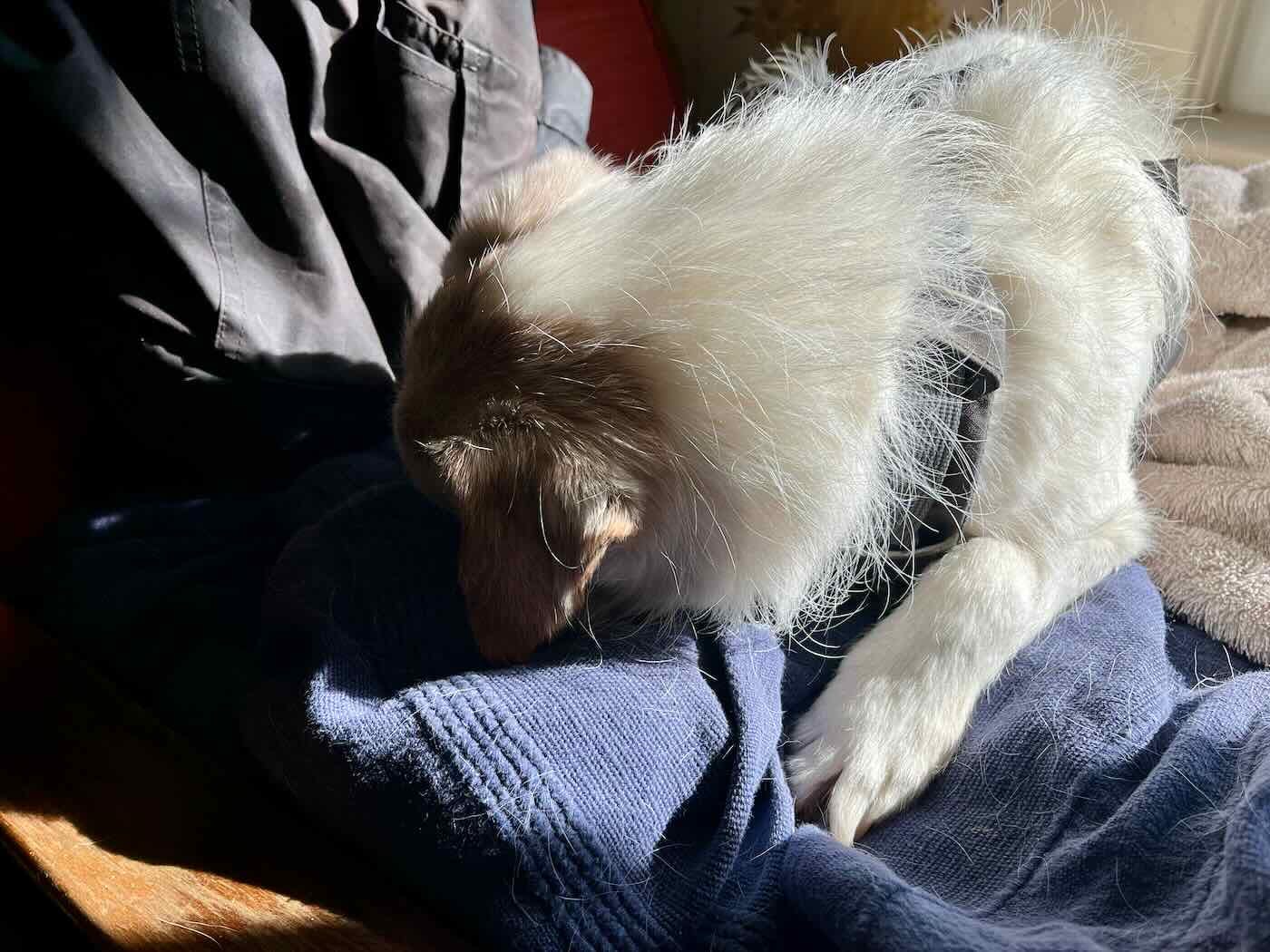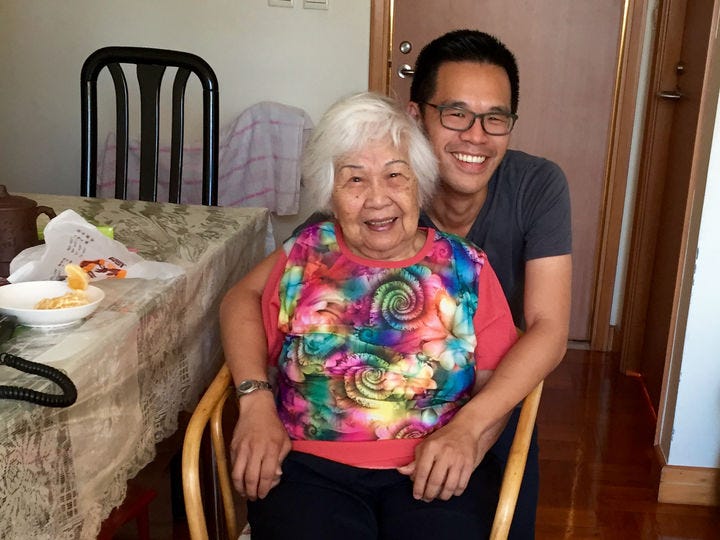Slow Down
Some fragmented thoughts on paying attention, navigating insecurity, dealing with disappointment, walking through grief, and noticing the croci
Thursday, March 9
Grand Rapids, Mich.
A friendly hello, dear reader.
We’ve had brilliant sunshine four out of the past five days. The light lingers in the evenings. The crocuses—croci?—have begun popping up in the yard. And our dear old Fozzie has managed not to poop inside the house for three out of the past four nights. Here’s to small victories.
Last week, I asked if you had any questions. Some of you did. I’m going to answer only a handful today, because I can’t seem to do anything in just a few words. Maybe we’ll get to some of the others in coming weeks.
What practices/life tools do you use to cultivate your ability to observe so thoroughly and weave your observations together so regularly?
I’m still learning.
So much of observation is a matter of taking time and making space. You hold something back (say, your voice, your commentary, your longing to be seen or heard) so that something else can take precedence (your awareness of others, your ability to notice what’s going on both in them and in yourself, your work to recognize patterns of behavior). The world rushes about. So many people try to say the smart or interesting thing. They clamor for attention. But maybe the better way is to slow down and pay attention.
I realize now—I’m grateful now—that I was reared in a culture in which my voice wasn’t expected to fill silences. At the Chinese family table, a polite child doesn’t speak unless spoken to. That leaves plenty of time and space to listen as well as to study—and I use the word “study” intentionally here, because it’s rooted in an Old French word that means “to examine.” As the lazy Susan spun, I had to time to examine—really, to wonder: Why is that uncle so angry? What happened to make that elder constantly try to interject himself into the conversation? How did my dad become so skilled at Cantonese wordplay? Why does that aunt pepper the meal with her nervous laughter? How do non-lazy Susans feel about lazy Susans?
I realize now—I’m grateful now—that while marginalization has its costs, it also offers benefits. Being a wallflower in so many rooms can be frustrating, yes, but you also get so many different other angles, so many different other vantage points from which to study the geometry. You learn to read those rooms and the people in them. What can be a tool for survival can also be a practical skill—not just for the journalist, as I learned when I was a young reporter at Time, but also for the human.
Occasionally, our storytelling at Time required us to appear on TV and radio, so I was sent to media training. It was awful: I always prefer asking the questions to answering them. We were recorded on camera, on the receiving end of mock interviews, and then we were forced to watch those recordings, frame by frame, sentence by sentence. I had to observe myself stammering through some responses, speeding through others, all the while hoping that I neither sound stupid nor say anything wrong. “You need to smile more,” the trainer told me, which did not make me want to smile at all. (When I reported this feedback to my mother, she said, “I told you so.”) “And you need to slow down,” the trainer said.
These were not unrelated pieces of feedback. Pausing to smile was both annoying and also useful, because it gave me a beat to gather myself. To slow down is to give yourself an opportunity to pay attention. Let your brain run at least a few seconds ahead of your mouth. Buy yourself a moment—or more!—to consider carefully what you want to say and why. Never think out loud.
Obviously, when I’m writing to you, I have more time to analyze and process than I do when I’m doing a live Q&A. It’s not like I sit down for half an hour and vomit out a letter to you, or an article, or a sermon. To make sense of one’s observations can take hours or days or weeks. Sometimes I’ll make a note on a Thursday and return to it on Friday and then discard it on Saturday and then retrieve it on Sunday. I even have drafts that have sat unfinished for months.
I can’t say what slowing down might look like for you. Not everyone has a Fozzie who walks at a glacial place and who reminds us multiple times a day how slowness can feel. But even when I’m writing, I end up staring out my study window a lot. Just now, I noticed a starling perched on a still-bare branch of the redbud tree next door. It did not seem in a hurry to get anywhere. It cocked its head this way and that, no doubt making its own space to observe.
One thread in several of the questions I received: connection and relationship, how we understand ourselves and how we perceive others. Maria, for instance, asked about insecurities: “How do you keep being kind to yourself when all the insecurities keep shouting out to you?” In a similar vein, Lorraine wondered, “How do you work through disappointment, especially when you feel let down by someone close to you?”
Again, I’m still learning. I am deeply insecure! I spent a sleepless hour between 3 a.m. and 4 a.m. on Wednesday wrestling with my fears and self-loathing! Disappointment and I are embroiled in a difficult, long-term relationship!
In seminary, I took some outstanding courses in nonviolent communication. One question we were taught to ask: What do I need right now? Our society frowns on neediness: That very word might have repulsed you! Our professor gently taught us that we can see need not as weakness but as invitation. Self-sufficiency is a lie. To name need is to accept part of our humanity, to acknowledge our limitations, to admit our desires, to open us to relationship. (The Center for Nonviolent Communication offers this helpful inventory of human needs. It’s not comprehensive.)
Especially in moments of stress, to identify one’s unmet needs can be a kindness. Underneath my insecurity, there’s unmet need. What I need in moments of blazing insecurity—and what you might need in those moments—is often a little pep talk, a small reminder of something essential, a tiny word of encouragement. If the answer to the question, “What do I need right now?” is, say, steadiness or stability, I can say to myself, “I am loved. I give myself the reminder that I am loved, and I steady myself in that love.” Or sometimes I’m feeling unmoored by the sense that I haven’t gotten the respect that I deserve. Then, I can tell myself: “That person might not have shown me respect, but I’m going to give myself the respect that I think I deserve.” It might seem woo-woo or weird—it did to me at first—but it’s a remarkably effective tool for grounding myself and helping me take a second look at my actions and reactions.
Part of the suckage of being human is that we will be disappointed—sometimes by others, sometimes by ourselves. To love is to risk. To be tender is to be open to the possibility of hurt. To be fully human is to make ourselves vulnerable to the prospect of failure. To feel let down is an inevitability—and it’s also an opportunity to have an unmet need identified.
Disappointment is a feeling (here’s a helpful inventory of feelings)—and feelings are often indicators of unmet needs. When I’m disappointed, it means that I craved something—connection, perhaps, or autonomy, or agency—that I did not get. Sometimes, identifying that need means that you can go to the person in whom you’re disappointed and talk through that dynamic. Sometimes, identifying that need will help you realize that it wasn’t about them at all; there was something going on in you, something that you actually have the power to address.
One of the core needs that each of us has is to matter. When I want to be seen or heard, when I want respect or long for connection, so often the underlying need is to know that I matter. When Fozzie is napping on the chair by my desk and I wander over to scratch behind his ears, even though I know I will wake him, it’s often because I want to know that I matter to him in some small way. Occasionally he’ll give me a contented sigh. He also does this thing where he purrs, almost like a cat, which he’d hate for me to say, because he detests cats. But other times, he’ll turn away in irritation, because I interrupted his nap.

Fundamentally, my mattering can’t depend on the reactions of a fickle creature like the Fozz. It has to be rooted in the conviction that I matter—we all do—to the One who made us and who loves us. That’s the only true antidote I know to the insecurities and the disappointments that come with being human. On my better days, I remember that. On my not-so-good days, I try to summon reminders of that truth.
A question from Sharon: What are your rituals around grief and death? How do you think churches might develop and nourish these rituals so that the dying are companioned?
When the Baptist missionaries arrived in Hong Kong and southern China in the 19th century, many of the practices that they encountered were alien to them. They branded some of those practices “heathen,” including many of the traditional rituals around grief and death. Yes, the missionaries brought some good news. But they also imported and imposed southern American culture. Well over a century since my first ancestors were converted, we’re still grappling with that.
After my grandmother died in 2017, I wrote an essay in Catapult about my family’s struggle around the rituals of grief and death. We wrestled with what Chinese Christians could and should do. Honestly, “flailed” might be a more apt word. We ended up with a jumbled mix that I really couldn’t make much sense of, except that it all was our best attempt to honor both our culture and our faith. I didn’t have much say in any of it (see above, about the place of the Chinese child in the family structure, and as my mother has regularly reminded me throughout my life, “You will always be my child”). But I did get to observe the tensions and the longings.
We often forget that our faith is inextricable from our culture. How we express our faith, how we talk about the divine, how we talk to the divine—all of this is enmeshed in our culture. But the ways in which we live out our culture can have different motivations. Do we do what we do just because it’s always been done? Or do we make choices based on what’s helpful, what’s healing?
I wish I could have told my elders that what mattered most was their heart—that honoring both Grandma and grief wasn’t so much a question of doing the right thing but rather coming to it all with the right spirit. Martin Luther is often quoted as writing, “Love God and sin boldly.” What he actually wrote was significantly less pithy: “Be a sinner, and let your sins be strong, but let your trust in Christ be stronger, and rejoice in Christ who is the victor over sin, death, and the world.”
The missionaries could have taken a posture of curiosity and helped the converts reframe culture and tradition; they didn’t. But we still can—and that’s what I try to do. For instance, Chinese people who have experienced a death of a close relative are not to visit other people’s homes or send wedding gifts during the mourning period. Traditionally, that’s based on the notion that you don’t want to spread the spirits of death. I’ve chosen to reimagine that: We need time and space to grieve and to tend to our sorrow. The traditional framework can be understood to make space for that.
It’s interesting to me that, in Sharon’s question, her emphasis is on companionship for the dying. I like this! At its best, the Christian traditions around companionship for the dying—last rites, say—remind them of the endless care and steadfast love of their Creator. And also, I want to understand “companionship for the dying” more broadly: We’re all in the process of dying. Many of the rituals, churchy and otherwise, are intended to bolster those who are a bit further behind in the process.
If you’d like to read more about faithful rituals around grief and death, I commend to you Amanda Held Opelt’s beautiful, thoughtful book A Hole in the World: Finding Hope in Rituals of Grief and Healing, which I wrote about last year. Many of the cultural rituals Amanda writes about were unfamiliar to me. But the reasons for them resonated deeply.
To me, the most interesting part of doing some Q&A with you all is not what I have to say. I’m always more eager to know what these thoughts might inspire in you. What irks you or leaves you with more questions? What makes you uncomfortable or sparks an insight or a story?
What I’m Reading: Earlier, I mentioned the crocuses/croci. Margaret Renkl, whose writing always makes me think, had a piece in the New York Times this week about the early arrival of spring—redbuds and bluebirds and all those reminders of the arrival of new life. I read it on Monday morning. The afternoon before, I had been startled by the appearance of the crocus blossoms in our front yard. It seemed early, and after looking back at my photos from last year, I realized that we’re several weeks ahead of where we were last winter. Nature has its variations, of course. But I also think it’s worthwhile to keep paying attention to humanity’s fingerprints on this fragile earth.
As I mentioned last week, I’ve returned to my Lenten practice of sending postcards to folks who could use a word of encouragement. So if you think of someone who might not mind such a note, even from a random stranger, please email me (makebelievefarmer@gmail.com) with their name, their postal address, and maybe a sentence or two to give me some insight into what’s going on with them. I’ll get a postcard out to them as soon as I can.
To be clear: Please do not write me and ask for a postcard for yourself. It’s not that I don’t think you need the encouragement or that I don’t like you. It’s just not what we’re doing here. Part of this is about thinking of others. As you think of friends or loved ones who could use a good word, perhaps you might send them one too.
That’s all from me for this week. As always, I’m so glad we can stumble through all this together, and I’ll try to write again soon.
Yours,
Jeff




I loved how you emphasized that idea of paying attention instead of striving to get attention. My fiancé and I just recently got engaged. In May, I’ll be moving to Finland (my fiancé’s home country). To be honest, since my fiancé will be the sole financial provider at least at first and I’m kind of stepping down from everything here to have a new beginning there, I’ve been worried about how I will establish this sense of being valued by the community. I’m struggling with thoughts and fears that my fiancé’s skills are valued in the community, but mine might not be. There’s this longing to be valued and to be known as more than just “his American wife”. Anyways, reading your writing was a good reminder that it’s ok to just quietly observe for a while, that learning about the people can help me discover how to love and relate to them.
From an occasionally lazy but often not, Susan, I have preferred to call that brilliant, ease filled solution of a device an “efficient Susan” for a while now! (And I ALWAYS let people know when they call it lazy!) 😆